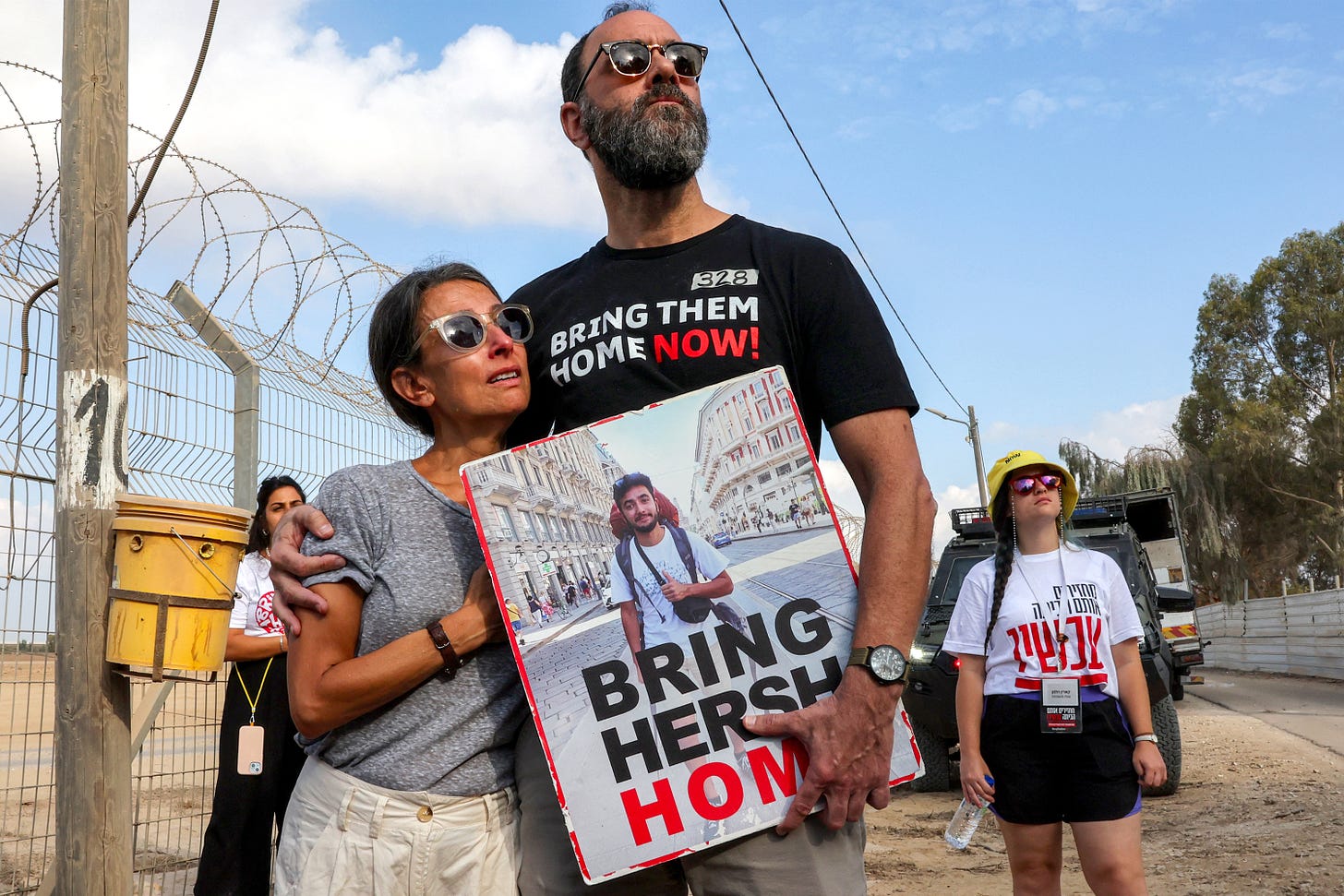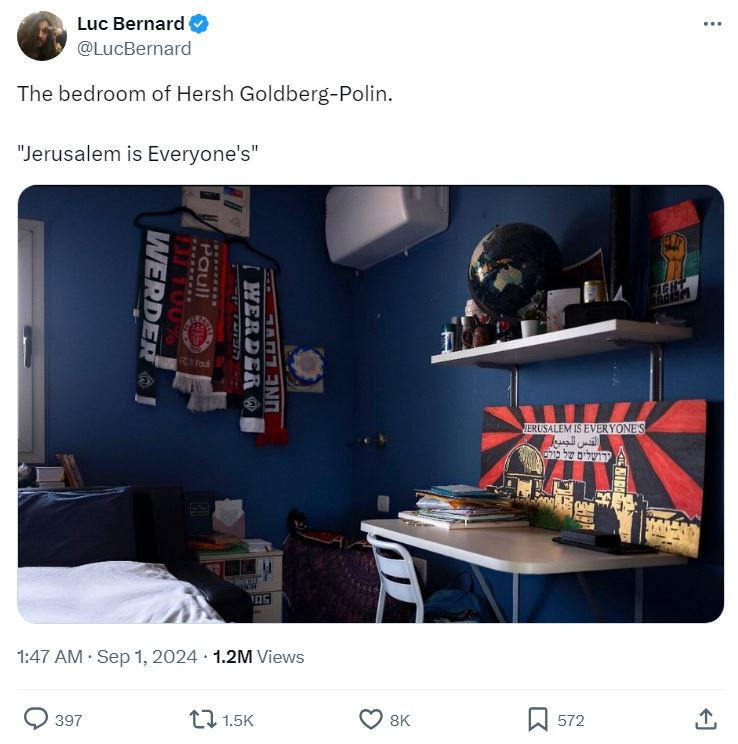

“EVERY PERSON IS AN ENTIRE UNIVERSE. We must save all these universes.” Those words were spoken by Jon Polin at the Democratic National Convention on August 21 in an eloquent plea for the release of the hostages taken by Hamas last October 7. At that point, Polin’s son, Hersh Goldberg-Polin, a 23-year-old with Israeli and American citizenship, was alive. He had been in captivity for 320 days. Ten days later, he was among the six hostages found shot dead in Rafah in the Gaza Strip: an entire universe murdered, along with five others.
Everyone’s universe is one of a kind; Hersh Goldberg-Polin’s was both extraordinarily rich and extraordinarily tragic. A Berkeley, California native whose family moved to Israel when he was 7, Hersh has been described as having an avid curiosity about the world and about people. He had a passion for atlases and maps, had recently spent several months traveling in Europe on his own, and had planned to start a yearlong trip to Southeast Asia in December 2023. His father had hoped he would become a correspondent for National Geographic.
Hersh had also had, apparently, a passion for peace. Like many of those killed or taken hostage on October 7, he had been, in the words of his mother, Rachel Goldberg-Polin, “an active peace pursuer.” He was no hardcore peacenik; he had completed mandatory service in the Israeli Defense Forces in April. But he worked to build bridges between Israeli Jews and Israeli or Palestinian Arabs and Muslims, through personal friendships and more: He had reportedly been involved in an initiative to bring together Jewish and Arab kids in a soccer league. A photo of his boyhood bedroom shared on Twitter by the Israeli anti-occupation group Peace Now Israel shows a poster on the wall that shows a stylized image of Jerusalem under an inscription written out in English, Hebrew, and Arabic: “Jerusalem is everyone’s”:
ON OCTOBER 7, FOUR DAYS AFTER HIS 23rd birthday, Hersh Goldberg-Polin was at the Supernova music and dance festival in the direct path of the Hamas raid. (According to his mother, he had planned to go to a different music festival that weekend, on the other side of the country, but that event was cut short because the organizers failed to obtain necessary permits.) His parents got two text messages from him: “I love you” and “I’m sorry.” When they tried to text back and call, there was no answer.
What followed was a wrenching saga of hope and heartbreak, the beginning of which was chronicled by Franklin Foer in the Atlantic a month after the attack. Jon and Rachel initially received a report that their son had been found dead. Then came the news that he and his friend, Aner Shapira, had been among a group of 29 festival attendees who had taken refuge in a bomb shelter. The terrorists started throwing live grenades inside; Goldberg-Polin and Shapira were picking them up and tossing them back out. According to an eyewitness, one grenade exploded. Aner was killed instantly; Hersh survived, but the blast blew off his left arm from the elbow down. Sometime later the terrorists pulled him from the bunker with the stump of his arm wrapped in a tourniquet (which he apparently tied himself with his non-dominant right hand).
Then, a mobile phone video surfaced that showed Hersh being led away from the bunker with several other hostages and loaded onto a truck, blood-spattered but still able to pull himself up onto the flatbed of the truck with one arm.
In the Atlantic interview, Rachel Goldberg-Polin insisted that her son’s homecoming was a matter of “when, not if.” Yet for the next six months, Jon and Rachel did not know whether their son was alive or dead—until April 2024, when Hamas released a hostage video. It showed Hersh sitting in a chair, his mutilated arm visible. He addressed his parents, telling them that he loved them, urging them to stay strong, and saying that he hoped the video would bring them comfort for Passover. Like other hostages who appeared in such videos, he excoriated the government of Benjamin Netanyahu for its war in Gaza—words that, whatever his actual opinion may have been, were clearly spoken under duress.
The Goldberg-Polins campaigned tirelessly for their son and the other hostages. They met with political and religious leaders including President Joe Biden and Pope Francis, Before their appearance at the Democratic convention, they had spoken at the United Nations. On December 28, 2023, the day Hersh was going to leave on his trip around the world, his parents, friends, and supporters held a “Bring Hersh Home” rally at Ben Gurion Airport. Passengers on what would have been his flight were given his photo and stickers to post in the cities he had intended to visit.
Rachel Goldberg-Polin’s advocacy got her selected by Time in April as one of the 100 most influential people of 2024, an honor that she had no doubt wished had passed her by. In her interview in Time, she reiterated her belief that her son would come back: “Hope is mandatory.”
AFTER ALL THE TALK of Hersh’s release in a possible hostage deal, that hope finally died on August 31. His body and five others were retrieved by the Israeli military in a tunnel network under Rafah, half a mile from where another hostage, Israeli Bedouin Arab Farhan al-Qadi, had been found alive and rescued by the IDF just four days earlier. All six had been killed with gunshots at close range, within 48 to 72 hours of the gruesome discovery. In another unspeakably cruel twist, Hamas has released an edited video of all six hostages and has promised more. Whether these videos were filmed immediately prior to their murder or at some earlier point is unknown.
The allocation of blame is open to argument. Did Netanyahu’s intransigence doom a deal for the hostages’ release, or was it always futile to negotiate with terrorists who murder hostages in cold blood and taunt their families? Did the Biden administration’s objections to IDF operations in densely populated Rafah impede a hostage rescue, or does the slaughter of the hostages show that Hamas was not going to let them be rescued alive? Whatever the answers may be, the ultimate responsibility for these murders rests with Hamas and Hamas alone, as President Biden, Vice President Kamala Harris, and Harris’s running mate, Gov. Tim Walz, all stressed in their statements. For that matter, as much as Hersh Goldberg-Polin’s parents had urged the Israeli government to be more focused on the hostages—and deplored the human agony on both sides of the war—they had also made it clear that Hamas had chosen the war and that depriving Hamas of the ability to “replicate the atrocities of October 7th” was an essential goal.
Ultimately, the death of Hersh Goldberg-Polin and five of his fellow hostages is a devastating reminder of the stark evil of the October 7th Hamas attack—and of the fact that, as long as hostages remain in Hamas’s hands, this evil continues. It is also a reminder of the human reality of the victims and their families. A young man who had his whole life ahead of him survived a massacre, a horrific injury, a brutal abduction, and then nearly a year of captivity—only for his ordeal to end in cold-blooded murder. To quote the traditional Jewish words of mourning: May his memory be a blessing. May it also be a rebuke to the sort of “activists” who, under the cover of Palestinian rights, marched with Hamas flags in New York City two days after the hostages were found murdered.
















